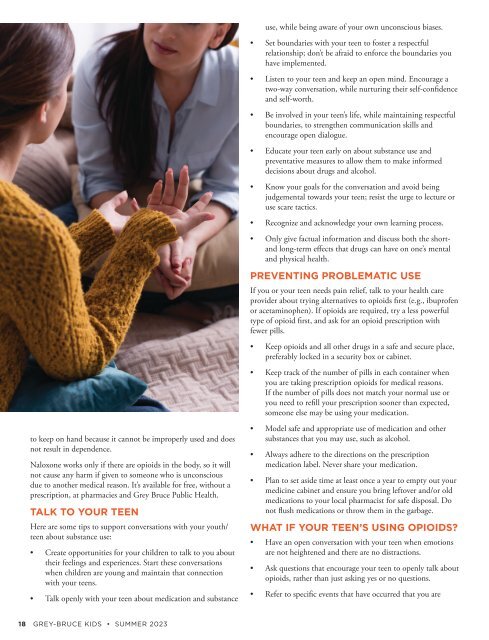Create successful ePaper yourself
Turn your PDF publications into a flip-book with our unique Google optimized e-Paper software.
use, while being aware of your own unconscious biases.<br />
• Set boundaries with your teen to foster a respectful<br />
relationship; don’t be afraid to enforce the boundaries you<br />
have implemented.<br />
• Listen to your teen and keep an open mind. Encourage a<br />
two-way conversation, while nurturing their self-confidence<br />
and self-worth.<br />
• Be involved in your teen’s life, while maintaining respectful<br />
boundaries, to strengthen communication skills and<br />
encourage open dialogue.<br />
• Educate your teen early on about substance use and<br />
preventative measures to allow them to make informed<br />
decisions about drugs and alcohol.<br />
• Know your goals for the conversation and avoid being<br />
judgemental towards your teen; resist the urge to lecture or<br />
use scare tactics.<br />
• Recognize and acknowledge your own learning process.<br />
• Only give factual information and discuss both the shortand<br />
long-term effects that drugs can have on one’s mental<br />
and physical health.<br />
to keep on hand because it cannot be improperly used and does<br />
not result in dependence.<br />
Naloxone works only if there are opioids in the body, so it will<br />
not cause any harm if given to someone who is unconscious<br />
due to another medical reason. It’s available for free, without a<br />
prescription, at pharmacies and <strong>Grey</strong> <strong>Bruce</strong> Public Health.<br />
TALK TO YOUR TEEN<br />
Here are some tips to support conversations with your youth/<br />
teen about substance use:<br />
• Create opportunities for your children to talk to you about<br />
their feelings and experiences. Start these conversations<br />
when children are young and maintain that connection<br />
with your teens.<br />
• Talk openly with your teen about medication and substance<br />
PREVENTING PROBLEMATIC USE<br />
If you or your teen needs pain relief, talk to your health care<br />
provider about trying alternatives to opioids first (e.g., ibuprofen<br />
or acetaminophen). If opioids are required, try a less powerful<br />
type of opioid first, and ask for an opioid prescription with<br />
fewer pills.<br />
• Keep opioids and all other drugs in a safe and secure place,<br />
preferably locked in a security box or cabinet.<br />
• Keep track of the number of pills in each container when<br />
you are taking prescription opioids for medical reasons.<br />
If the number of pills does not match your normal use or<br />
you need to refill your prescription sooner than expected,<br />
someone else may be using your medication.<br />
• Model safe and appropriate use of medication and other<br />
substances that you may use, such as alcohol.<br />
• Always adhere to the directions on the prescription<br />
medication label. Never share your medication.<br />
• Plan to set aside time at least once a year to empty out your<br />
medicine cabinet and ensure you bring leftover and/or old<br />
medications to your local pharmacist for safe disposal. Do<br />
not flush medications or throw them in the garbage.<br />
WHAT IF YOUR TEEN’S USING OPIOIDS?<br />
• Have an open conversation with your teen when emotions<br />
are not heightened and there are no distractions.<br />
• Ask questions that encourage your teen to openly talk about<br />
opioids, rather than just asking yes or no questions.<br />
• Refer to specific events that have occurred that you are<br />
18 GREY-BRUCE KIDS • SUMMER <strong>2023</strong>
















